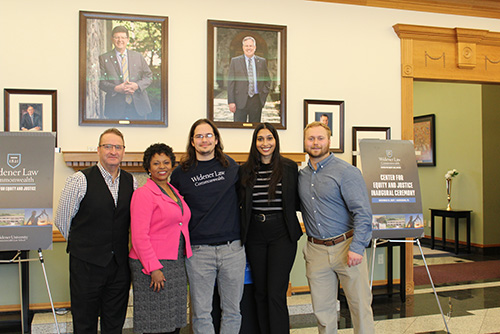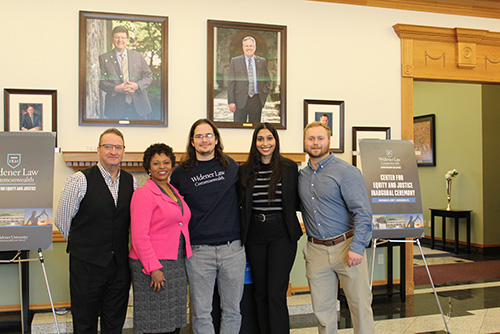
Widener Law Commonwealth Provides LSAT Prep for National Legal Pathway Program, Reaching 1,000+ Aspiring Law School Applicants
Widener University Commonwealth Law School has once again provided LSAT preparation to LSAC’s Plus, Guided Journey Program, which has more than doubled in size, now serving more than 1000 scholars this year.
The school’s Center for Equity & Justice recently secured a $110,000 contract from LSAC to administer the 12-week LSAT Prep portion of the Plus program, marking the second consecutive year of partnership and signaling confidence in Widener Law Commonwealth’s approach to equity in legal education.
LSAC’s Plus, Guided Journey is a free fourteen month program open to all and is built to support individuals as they prepare for and apply to law school. The program is rooted in LSAC’s mission to advance law and justice by promoting access, equity, and fairness in law school admissions. Dean andré douglas pond cummings stated, “… women, people of color, and first-generation students historically were excluded from the profession. This program dismantles those barriers and replaces them with a blueprint for success.”
Plus, Guided Journey is rooted in community, skill development, and accountability. Throughout the program, scholars receive support based on their current stage of the application cycle. The first of these stages is the preparation for the LSAT, a high-stakes exam critical for law school admission and is predictive of first year law school performance. For this part of the program, LSAC is proud to partner with Widener’s Center for Equity and Justice.
“We are very pleased to partner with Widener Law Commonwealth again for the LSAT Prep portion of the Plus program”, said Laura Fonseca, Senior Director of Programs and Initiatives at LSAC. “Our scholars are supported and celebrated in a way that aligns wonderfully with our mission and values. The positive impact Widener is having on each of their journey’s is truly remarkable.”
The Center for Equity & Justice now leads the instructional design of the 12-week LSAT preparation portion of the Plus program, operating with just two faculty advisors and three student fellows—but reaching hundreds more.
“The program is really just bigger in every way than last year,” said Ely Zeigler, a rising third year law student, fellow at the Center, and lead LSAT instructor in the program. “There are more students, more instructors—many of whom came up through the program—and more support both financially and in terms of access.”
“It is significant because we are literally helping the next generation of lawyers get into law school,” said Tara R. Smith, a third-year law student, fellow at the Center, and the administrator for the LSAT prep portion of the Plus program. “By helping scholars navigate the LSAT, we’re also helping them connect to others across the country who share the same dream. The Plus program is rare, and it’s incredible that we have the opportunity to administer the LSAT preparation portion of it.”
cummings echoed that sentiment: “There are nearly 200 ABA law schools in the country. LSAC could have partnered with any of them—and they chose Widener Law Commonwealth to run this program based on our very successful Pathway Program and approach to critical skill building. That speaks volumes about who we are and what we’re accomplishing here.”
Smith agreed, noting that the contract signals growing trust in the Widener Law’s capabilities. “It tells me the work we’re doing adds significant value,” she said. “LSAC sees the collective power in connecting students to take on the challenge of the LSAT together and structured the Plus program to include this key component. That changes the dynamic of the legal profession—away from adversarial, toward collective support.”
Widener Law Commonwealth’s impact is reaching far beyond central Pennsylvania. The students benefiting from the Plus program represent a wide range of backgrounds, and many face challenges that go beyond academics.
“Some students are first-gen high school grads, some are first in their families to go to college, and some will be first to go to law school,” said Zeigler. “We’re trying to provide appropriate support and level the playing field so that merit climbs to the top—not just access or resources.”
The yearlong Plus program offers much more than 12 weeks of LSAT preparation and focuses holistically on support, including community building. Smith emphasized its value as a support system, especially for first-generation students.
“It shows them they belong in law school and in the legal profession,” Smith said. “And I think it’s even more meaningful that our dean shows up for them every day while they are in LSAT preparation. That sends a powerful message.”
cummings underscored that point: “This is how we build belonging. We meet students where they are, and we walk with them. We’re showing them they are not alone—and that they absolutely belong in this profession.”
Instruction is collaborative, not competitive. Zeigler describes his classroom vibe as “relaxed” and focused on collective understanding.
“If I ask for the conclusion to a question and someone gives me a line, I turn to the class and ask how we feel about it,” he said. “When students get over the fear of being wrong in front of others, participation goes way up.”
Students take 11 full length, timed practice LSAT’s on LSAC’s LawHub platform during the program—a strategy that helps combat test-day anxiety and builds familiarity through repetition.
“There’s no shortcut to success,” Zeigler said. “Sometimes you have to run through something 10 times so that on the 11th, you’re calm.”
For Smith, supporting students through the pressure of LSAT prep means helping them regain focus and confidence.
“My goal is to always leave them feeling empowered and ready to take the next step,” she said. “Sometimes they just need a reminder that they are capable of whatever they set their mind to.”
Both fellows highlight the fact that the heart of the Plus program lies in building community—among students and instructors alike.
“In this new digital age, something that is truly lacking is connection,” Smith said. “We are cultivating that here. Community and connection are crucial to success, and we are thrilled to help Plus scholars build that through the LSAT Prep portion of the program.”
Aminta Moses Sharps, Pathway and Education Programs Manager at LSAC who manages the Plus program, also praised the instruction provided in the LSAT Prep portion of the program, highlighting the involvement of Plus program alums. “The inclusion of former Plus scholars as LSAT prep instructors this year has really changed the game in terms of building community and confidence in the program, and we look forward to more Plus scholars joining us in this capacity as the program continues to grow and improve.”
The significance of the program isn’t just in Ivy League acceptances, Zeigler emphasized—it’s in the lives it changes.
“There are students who, without this program, might’ve scored a 142 and not gotten into law school,” he said. “If we help them get to a 149—that’s a law school score. That’s someone who now gets a chance to prove themselves and become a great lawyer.”
Smith said the most rewarding part of the job is seeing that impact firsthand. “We are excited to work with the nearly 1,000 determined individuals enrolled in the Plus program and helping them reach their dream is truly an honor,” she said. “We are actively breaking down barriers and creating real access. I genuinely love every hour I put into this work.”

The Center for Equity & Justice plans to continue its partnership with LSAC as the Plus program continues to grow by building out its instructional team with scholars who both know the test and know how to teach.
Widener Law Commonwealth’s leadership believes its involvement with the Plus program and its continued collaboration with LSAC has positioned the law school—and the Center—as a national hub for LSAT instruction rooted in access, community, and equity.
“We are helping to transform lives,” said cummings. “And that’s exactly what legal education should do.”
